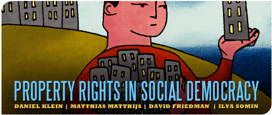Lead Essay
In his lead essay, Daniel B. Klein introduces us to the idea of overlordship – the premise, implicit in modern social democracy, that the state is the ultimate owner of all property rights in society. Under this theory, the state provisionally delegates any rights that individuals may have, and it is free to revoke them as well. The social contract, to which we have all allegedly subscribed, gives warrant for these acts, or so we are told.
Though his formulation may seem quite harsh – “overlordship” is a term we more often associate with feudalism – Klein traces its development in the late nineteenth century, citing authors who were quite explicit about their intentions. He also cites recent figures, up to and including President Barack Obama, who subscribe to substantially the same views. Klein calls for a return to individualist modes of ownership, as championed by David Hume and Adam Smith, both of whom were also skeptical of the social contract in general, owing in part to the dangerous consequences implicit in that mode of thinking.
Response Essays
Matthias Matthijs charges that libertarian thinking caused the biggest economic disaster since the Great Depression, and that our current political climate is nonetheless still dominated by an ideology highly congruent to Daniel Klein’s. Reasonable people, however, now doubt even market capitalism itself. Libertarians and social democrats disagree on three fundamentals: the empirical evaluation of government efficacy, the positive/negative liberty distinction, and the absolutism of private property rights. On each disagreement, Matthijs argues, the social democrats have the upper hand. In particular, property rights would not exist without the state to regulate them, and these rights are in no sense “natural.” A natural right, Matthijs argues, would never have any need of defense by the state.
David Friedman suggests a threefold classification of rights. In his scheme, normative rights are moral claims whose violation results in a moral judgment: I may think, with reason, that you are a bad person. A legal right is one that has been duly written into the law. Finally, a positive right is one for which violators face meaningful consequences, such that they will be substantially deterred. These definitions differ somewhat from those found in traditional legal theory, but Friedman defends the analytical power of his schema. In practice the three types overlap, but we may still analyze rights according to their normative, legal, and positive dimensions. Friedman offers historical and contemporary examples of the three types of rights and speculates on their origins using game theory.
Ilya Somin examines three arguments for government control over property rights: the claims that property rights are created by the government, that residence and/or citizenship imply consent, and that government control can produce superior outcomes to private control, regardless of theoretical justification. He dismisses the former two and concedes that the latter, consequentialist argument for government control is the strongest of the three. Still, he argues that this approach has serious weaknesses, in that people across the political spectrum tend to overestimate the good that governments can do.
The Conversation
Related at Cato
- Research: Cato research page on property rights.
- Unbound: Slippery Slopes and the New Paternalism.

